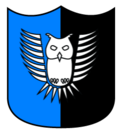Monarchy of Delkora
| King of Delkora | |
|---|---|
| Kongen af Delkora | |
Federal | |
 | |
| Incumbent | |
 | |
| Haldor VII since 1974 | |
| Details | |
| Style | His Majesty |
| Heir apparent | Ingrid |
| First monarch | Asmund I |
| Formation | 982 CE |
| Residence | Valdenharm Palace |
The Monarchy of Delkora is the constitutional monarchy of the Kingdom of Delkora. The monarchy dates back to 982 CE and has undergone many changes and reforms since then.
History
Constitutional role
Since the adoption of the Constitution in 1833, the monarchy is relegated to a mostly symbolic role in Delkoran society. The monarch is the head of state and the source of federal executive power. He also holds the position of commander-in-chief of the armed forces. These powers, however, can only be exercised on the advice of the government. The monarch possesses relatively few reserve powers.
After an election, the Federal Parliament nominates a chancellor candidate whom the monarch is constitutionally obligated to appoint. The monarch is responsible for granting royal assent to legislation passed by the Federal Parliament in order for it to take effect. In the event the monarch denies or withholds consent, which is exceedingly rare, the legislation is considered promulgated after 10 days. As a result, he can at most delay but not veto laws.
Aside from these powers, the monarch also formally appoints ambassadors, federal judges, senior members of the civil service, and commissioned military officers on the advice of the government. Prior to 1833, these officials would swear an oath of allegiance to the monarch, but now this oath is taken to the Constitution instead. The monarch also receives the credentials of foreign ambassadors, welcomes visiting heads of state, and represents Delkora on official trips abroad.
Cultural role
In addition to its constitutional role, the Delkoran monarchy is seen as a symbol of the Delkoran people. The institution is known for its informal character and sensitivity to public opinion. Members of the royal family attend state schools in Norenstal and frequently make unscheduled appearances at public gatherings such as festivals and concerts.
Succession
Rules governing succession to the throne are spelled out in ordinary legislation. Currently, succession is based on absolute primogeniture. Following the death or abdication of a monarch, the Federal Parliament must pass an instrument of succession certifying the heir apparent as the legitimate successor. Afterward, the heir apparent takes the following oath of office in front of the Chamber of Representatives: "I {Name} do solemnly swear/affirm that I will at all times act in the best interests of the Delkoran people and in accordance with the Constitution and laws of the Kingdom, and that I will exercise my powers only on the advice of the government."
The Federal Parliament can modify the line of succession, for example by skipping over an heir apparent. In the event an eligible successor to the throne cannot be identified, the Federal Parliament is empowered to appoint a successor.
Under the Delkoran Constitution, the Federal Parliament can dethrone a sitting monarch by a two-thirds majority vote of both chambers, although this provision has not been used to date.
Royal family
The Delkoran Constitution vests the monarchy in the House of Valdenharm. As of 2021, the members of the royal family are:
- Haldor VII, King of Delkora
- Elsa, Queen Consort of Delkora
- Crown Princess Ingrid, Duchess of Cybria
- Princess Ellinor, Duchess of Banderhus
- Princess Astrid, Duchess of Vassengård
- Prince Valmar, Duke of Førelskov
Residences and wealth
The royal family's official residence is Valdenharm Palace, located in Norenstal on the bank of the Trydenvar River. The family also has a vacation home in Vassengård. The family previously owned numerous other properties around the country including Gaerhus Palace and Meldenborg Castle, although these were brought under public ownership in 1960 by the government of Mette Elvensar. They are now under the administration of the Office of Historical Perseveration and open to the public as historic sites.
In 2020, the Delkoran royal family had an estimated net worth of ⊻12 million, making it among the least wealthy in Eracura. Historically, the family had a much larger personal fortune, but much of it was expropriated in the 1960s under the New Kingdom program. The monarch and other members of the royal family are subject to federal, state, and local taxation. Their finances are available for public inspection.